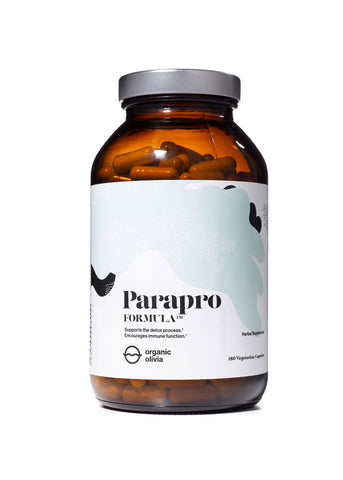Parasite cleanses are all the rage these days, claiming to be the panacea for nearly all of our ailments. Yet with this fad comes a lot of fear-mongering, creepy sci-fi imagery, and confusion. Haven’t we all heard horror stories about that one friend-of-a-friend who did a cleanse and was shocked about what came out of them?
The truth is, you’ve probably had a parasite at one point or another. After all, approximately ¼ of the global population has one! In reality, they’re far less extreme than people make them out to be, and nothing to freak out about.
What is a parasite?
Before we get into the ways parasitic infections take hold, let’s review the basics. By definition, a parasite is technically any living organism that survives by feeding off of a host, which in this case, is us humans. Parasites fall into three distinct categories:
- Protozoa: single-celled, microscopic organisms (like Giardia, Cryptosporidium, Entamoeba histolytica, and Plasmodium, aka malaria )
- Helminths: larger worms (including hookworm, tapeworm, pinworms)
- Ectoparasites: organisms that live on the surface of your skin (lice, fleas, scabies, chiggers)
Ways to pick up parasites:
Parasites hang out in contaminated water and meat, soil/poop, and other living things. So if you’ve traveled overseas, backpacked through the wilderness, lived with a pet, or eaten some dodgy raw fish, you may have picked something up along the way. More often than not, these kinds of parasitic infections occur without any symptoms, making it quite hard to tell that you have one. Some of the more common ways humans contract parasites are:
- Drinking contaminated water
- Eating contaminated foods (especially raw fish, undercooked pork, or poultry)
- Owning pets
- Traveling abroad
- Kids not washing their hands
- Insect bites
- Direct contact with soil containing poop
- Human-to-human transmission
- Swimming in freshwater lakes and ponds
Signs that you may have a parasite:
One of the trickiest things about parasitic infections is that they can cause a whole host of nonspecific symptoms, making them hard to diagnose. Of course, how the parasite enters your body and where it lives will determine which body system it affects. For example, if you’re experiencing mainly diarrhea and malnutrition, it could suggest a gut parasite like Giardia, while a skin rash could point to something more superficial like swimmer’s itch (cercarial dermatitis).
Here are some potential signs of a parasitic infection:
- Chronic fatigue
- Diarrhea or constipation
- Nausea or vomiting
- Unexplained weight loss
- Gas and bloating
- Abdominal cramping
- Nutrient deficiencies (including anemia)
- Insatiable hunger
- Skin conditions
- Insomnia
- Teeth grinding
- Itchiness
- Persistent brain fog
- A weak immune system
How to get rid of parasites:
Seek medical treatment – Once you’ve been tested for parasites and know exactly what organism you’re dealing with, you’ll likely be given an antiparasitic medication that targets the specific parasite you have. Because of this, antiparasitics are extremely effective and fast in treating the infection.
Lean on herbal remedies – If you feel like you need a proper gut reset to flush out lingering bugs, our flagship product, Parapro, is for you. This herbal formula contains powerful, clearing botanicals (like olive leaf, garlic, and wormwood) that detox your entire gastrointestinal tract and rebalance your microbiome.

ParaPro
A powerful combination of clearing botanicals that promote GI detoxification in order to support a healthy gut microbiome.*
STAR HERB: Olive Leaf
Consume anti-parasitic foods – While potent foods like garlic, onions, papaya, pumpkin seeds, cloves, turmeric, coconut oil, ginger, oregano, and probiotics can help prevent parasitic infections and offer support in fighting them off, these are not to be used as a replacement for proper medication (when needed). Also, avoid eating sugary or processed foods as these provide food for parasites and harmful bacteria.
Practice good hygiene – Wash your hands thoroughly and often, especially before meals, after using the bathroom and picking up dog poop. If you have kids in elementary school, encourage them to do the same, as we know that kids are more likely to pick up parasites from their surroundings than adults are.
















